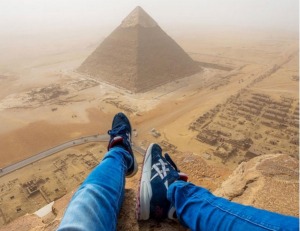
Staying within the law can be tricky enough in Australia – who hasn't done a few clicks over the speed limit? But when going overseas, there's a whole new set of legal minefields to negotiate. Every country has different laws and some of them are, quite frankly, weird. And a few seemingly innocuous things could get you into rather a lot of trouble…
In the zealous quest for cool-looking selfies, German tourist Andrej Ciesielski managed to get himself into a lot of bother earlier this year. Climbing to the top of the Cheops pyramid, just outside Cairo, the 18-year-old got some excellent Instagram shots. But he also got some quality time with the Egyptian police, then banned from the country for the rest of his life.
Similar rules can apply elsewhere, although the problem is that it's applied very, very inconsistently. For example, in Mexico, you're allow to go clamber on the massive main building at Ek Balam – but try the same at Chichén Itzá and you'll have burly guards all over you within seconds. If in any doubt, check first.
Think France is wonderfully laissez-faire? Well, think again if you've any plans to go driving there. There's a whole list of kit that drivers are supposed to carry in their car – including warning triangles and breathalysers.
Perhaps oddest is the requirement to have a high visibility vest, or other such reflective clothing, in the car at all times. This is in case of a breakdown – getting out of the car on the hard shoulder of a motorway is no fun in the first place, but even less so if you get slapped with a €135 fine for not looking like a construction worker.
Similar laws are in place across Europe, although applied slightly less rigourously. British motoring organisation the AA has a good list of what's needed where.

ERCEN1 Woman with car puncture using a can of tyre sealant and inflater Photo: Matthew Richardson / Alamy Stock Photo
Another problem that's surprisingly common across Europe is the illegality of devices that can detect and alert you to speed radar guns or cameras. While very few people buy something that specifically does this, any GPS system or mobile phone app that picks up speed cameras is technically falling foul of the law. In many countries, you'll probably be alright just disabling that function. But France again is particularly strict – and you can be fined by intransigent gendarmes even if you're not using the GPS to pick out speed traps.
Earlier in February 2016, 32 Westerners were arrested in Pattaya, Thailand, under anti-gambling laws. Their bridge club was raided, and the members were detained for twelve hours after falling foul of a fairly arcane law that prohibits anyone from carrying more than 120 playing cards. So two packets, you're fine. Any more than that, and the police can legitimately nab you.

Bridge players keep playing as authorities raid a Jomtien & Pattaya Bridge Club meeting in Pattaya. Photo: Youtube
A far more serious Thai law to be very aware of indeed is the part of its criminal code that deals with lese majeste. This states that anyone who "defames, insults or threatens the king, the queen, the heir-apparent or the regent" can face up to 15 years in prison. That broad sweep includes things like speculating about the king's health, discussing who might succeed him and a whole load of other seemingly innocuous conversational gambits. In short, the subject is best avoided altogether.

Thailand's King Bhumibol Adulyadej is surrounded by his daughters on his 85th birthday. Photo: Getty Images
Last year in Dubai, a court fined a man 3,000 dirhams (A$1,163) for swearing at another man on Whatsapp. Just in case that wasn't bad enough, though, the prosecutor then appealed, and the Supreme Court ruled that the fine was too lenient. It was found that the crime – seemingly applicable to all online communication – should be subject to 250,000 dirham (A$96,900) fines, plus possible imprisonment or deportation.
The UAE is also very strict on what drugs can be brought into the country – and what Australians might see as standard over-the-counter remedies are serious narcotics in Abu Dhabi or Dubai. Anything with codeine inside, in particular, is a no-no. But a large range of drugs are affected.
Unfortunately, the rulings are very hazy on what you have to do in order to bring such drugs in. In practice, you'll almost certainly not be asked to declare what you've got with you. But if carrying anything prescribed under Emirati law, at the very least it needs to be in the original packaging, accompanied by a doctor's letter listing what's on your prescription and that it's for you.
Other countries have similar laws, although most aren't high tourism priorities. Greece is a notable exception – it requires a letter from the doctor or a statutory declaration from the user for anything containing codeine.

Codeine-containing products are serious narcotics in the UAE.
You might think military chic looks cool, but police officers in the Caribbean aren't inclined to agree with you. On many islands – including popular holiday spots Barbados and Jamaica - wearing camouflage clothing is illegal. So it's best to leave anything that may pass for armywear at home.

Leave your armywear behind if you're heading to the Caribbean. Photo: iStock